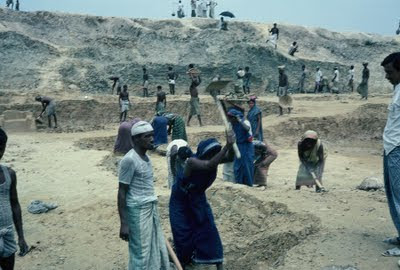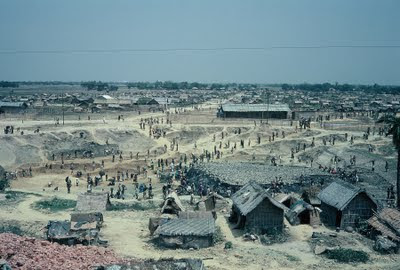Saturday, April 9, 2011
THE GAINESVILLE YEARS PART 8
Note to new readers: Read blog entries "The Gainesville Years, Part One through Seven to get the full story.
TWO TALES FROM TONGEE, BANGLADESH
Politics insinuated itself into the Bangladesh project, the kind of politics inherent in telling a story about Christian work in a Muslim country. Foremost in my mind as I created the script was making sure that nothing said or shown would in any way endanger the delicate relationship the ecumenical Christian community had built with the Bangladesh government or the Muslim and Hindu communities in which these groups worked. Because of this concern, some of the most interesting and touching stories I uncovered in my research never made it into the film. I would like to share two of them with you.
THE REAL STORY BEHIND TONGEE
If you remember, when the Presbyterian Church U.S. finally agreed to let Dr. Coddington go to Bangladesh it was under the condition that he would confine his activities to the hospital and his work with tuberculosis patients. And he did, until one day on his way to the hospital he witnessed an act so disturbing, so inhumane, he could not, in good conscience, ignore it.
On that day, as Dr. Coddington was driving through Dhaka, he noticed a dozen or more military trucks parked in front of the shantytown that took root in the city at the end of Bangladesh’s recent bloody war for independence. The rambling aggregation of unsightly shacks made of packing crates and other scavenged materials was home to hundreds of Bengalis—men, women and families who had been displaced by the war, or by one of the two destructive monsoon seasons that preceded and followed it.
The monsoons are the life blood of Bangladesh; the people depend on them for good crops. But for two years in a row the rains had struck with such destructive force that they reshaped the land, changing the course of some of its rivers. The shifting terrain left thousands homeless. Families who had contentedly tilled their little piece of land for generations abruptly found that land, and their homes, gone, swept away or buried at the bottom of a redirected river.
When Dr. Coddington reached the shantytown he heard raised voices: the soldiers were shouting orders, men were protesting, women were wailing. He got out of his car to see what was happening. Using axes, their rifle butts, metal pipes...anything handy... the soldiers were systematically demolishing all the shacks and herding their former residents into the waiting trucks.
Dr. Coddington learned later that government officials had ordered the shacks demolished because they were preparing for a conference that would bring corporate investors from around the world to Bangladesh. They feared this eye sore, this blight on their city, would tarnish the image they were trying to project of Dhaka as a place of infinite investment potential. But on that day the doctor wasn’t concerned about why this was happening. His only concern was for the welfare of the people being herded into the trucks. As one by one the trucks pulled away and headed out of the city, he made a decision. His work at the hospital would have to wait. He had to know where the people were being taken.
Dr. Coddington followed the military caravan out of Dhaka many miles into the countryside, to an abandoned rice field. He watched dismayed as the soldiers unceremoniously dumped their human cargo and left. How could they do this? The place was uninhabitable: There was no shelter for the people, not even a tree for shade. There were no amenities, no latrines, no source of potable water. Nothing.
He hurried back to the city. Whether he gave any thought to the promise he made to his church to limit his work I don’t know, but he immediately contacted all the Christian groups in the area and began a one-man crusade to find help for the abandoned community. It was not an easy task. The Baptists, the Anglicans, the Quakers, all of the churches wanted to help, but they were already stretched thin in personnel and money. Yet, by some miracle, Dr. Coddington was able to turn his compassion for these displaced Bengalis into a compelling vision and, in time, a sustainable plan.
You can see why this story never got into the film. The government would not have permitted it to be told. Nor would they have wanted the world to know the next story I am going to share with you, the story of the first woman I interviewed in Tongee.
A TALE OF UNIMAGINABLE LOSS
I had explained to my translator that this was to be a film of hope and promise. The purpose was to raise money for the project from Presbyterian churches in the United States, and my job was to help potential donors see the vision for Tongee and convince them that their donation was important and would make a difference. But the young woman insisted that to truly understand what was happening at Tongee I needed to talk to some of the people who were there before there was hope. There was one woman in particular she wanted me to meet.
We met in the newly completed health clinic. She was a slight woman, frail, with profoundly sad eyes—a Hindu woman. It is difficult to tell the age of someone who has been trapped in poverty all their life. Hunger, malnutrition, and chronic insecurity age a person. My best guess is that she was in her late teens or early twenties. “Tell the lady about that first night,” my translator prompted. The young woman nodded and began. I girded myself for a tale of hardship, but I was not at all prepared for the story this young woman had to tell.
When the soldiers dropped her and her baby in the field, along with the others, she said, she was very frightened. Not so much for herself, but for her little girl, who was only a few weeks old. She thought about trying to walk back to the city, but she knew it was too far. And she was exhausted. Thankfully, she had managed to retrieve a blanket from her shack before the soldiers destroyed it. Moving to the edge of the group, she spread the blanket out and lay down with her little girl. Before she knew it, she was asleep.
Sometime during the night she was awakened by what she thought was someone tugging at her. It was dark and she was half asleep; she couldn’t make out the figure hovering above her. Then her eyes adjusted to the darkness and she saw it...and screamed. It was a hyena. A pack had surrounded her, and one of the beasts had hold of her baby and was tugging at it. The young mother could hear people running towards her. Garnering all her strength, she tightened her grip on her little girl, but the hyena was stronger. With one quick move it snatched the baby from her arms and took off into the darkness with it. Some of the men ran after the beast, but they were too late. The child was gone.
The sad eyes looked into mine. There were no tears. She had cried for weeks, months, my translator told me. She had no tears left. I heard myself sob. I am seldom at a loss for words, but I could find none now. I finally nodded and feebly thanked the young woman for sharing her story with me, knowing that I would never use it in the film.
As I went about the rest of my interviews that day the story haunted me. I tried to console myself with the knowledge that there was now hope in Tongee, even for this sad-eyed young woman. For the first time in her life she had the possibility of a real home, a stable community. I was sure there would be more children for her, and because of what was happening in Tongee, a future more promising than any she had probably ever dreamed possible. Still, I was a mother. I knew how precious every child is. I knew that regardless of how much happiness this young woman would find in the future, nothing would ever completely erase her memory of that horrific night, or completely heal the profound sense of loss she will always carry with her for her lost baby girl.
NEXT: SOME HAPPIER STORIES, AND A REMARKABLE EASTER SUNDAY IN DHAKA
TWO TALES FROM TONGEE, BANGLADESH
Politics insinuated itself into the Bangladesh project, the kind of politics inherent in telling a story about Christian work in a Muslim country. Foremost in my mind as I created the script was making sure that nothing said or shown would in any way endanger the delicate relationship the ecumenical Christian community had built with the Bangladesh government or the Muslim and Hindu communities in which these groups worked. Because of this concern, some of the most interesting and touching stories I uncovered in my research never made it into the film. I would like to share two of them with you.
THE REAL STORY BEHIND TONGEE
If you remember, when the Presbyterian Church U.S. finally agreed to let Dr. Coddington go to Bangladesh it was under the condition that he would confine his activities to the hospital and his work with tuberculosis patients. And he did, until one day on his way to the hospital he witnessed an act so disturbing, so inhumane, he could not, in good conscience, ignore it.
On that day, as Dr. Coddington was driving through Dhaka, he noticed a dozen or more military trucks parked in front of the shantytown that took root in the city at the end of Bangladesh’s recent bloody war for independence. The rambling aggregation of unsightly shacks made of packing crates and other scavenged materials was home to hundreds of Bengalis—men, women and families who had been displaced by the war, or by one of the two destructive monsoon seasons that preceded and followed it.
The monsoons are the life blood of Bangladesh; the people depend on them for good crops. But for two years in a row the rains had struck with such destructive force that they reshaped the land, changing the course of some of its rivers. The shifting terrain left thousands homeless. Families who had contentedly tilled their little piece of land for generations abruptly found that land, and their homes, gone, swept away or buried at the bottom of a redirected river.
When Dr. Coddington reached the shantytown he heard raised voices: the soldiers were shouting orders, men were protesting, women were wailing. He got out of his car to see what was happening. Using axes, their rifle butts, metal pipes...anything handy... the soldiers were systematically demolishing all the shacks and herding their former residents into the waiting trucks.
Dr. Coddington learned later that government officials had ordered the shacks demolished because they were preparing for a conference that would bring corporate investors from around the world to Bangladesh. They feared this eye sore, this blight on their city, would tarnish the image they were trying to project of Dhaka as a place of infinite investment potential. But on that day the doctor wasn’t concerned about why this was happening. His only concern was for the welfare of the people being herded into the trucks. As one by one the trucks pulled away and headed out of the city, he made a decision. His work at the hospital would have to wait. He had to know where the people were being taken.
Dr. Coddington followed the military caravan out of Dhaka many miles into the countryside, to an abandoned rice field. He watched dismayed as the soldiers unceremoniously dumped their human cargo and left. How could they do this? The place was uninhabitable: There was no shelter for the people, not even a tree for shade. There were no amenities, no latrines, no source of potable water. Nothing.
He hurried back to the city. Whether he gave any thought to the promise he made to his church to limit his work I don’t know, but he immediately contacted all the Christian groups in the area and began a one-man crusade to find help for the abandoned community. It was not an easy task. The Baptists, the Anglicans, the Quakers, all of the churches wanted to help, but they were already stretched thin in personnel and money. Yet, by some miracle, Dr. Coddington was able to turn his compassion for these displaced Bengalis into a compelling vision and, in time, a sustainable plan.
You can see why this story never got into the film. The government would not have permitted it to be told. Nor would they have wanted the world to know the next story I am going to share with you, the story of the first woman I interviewed in Tongee.
A TALE OF UNIMAGINABLE LOSS
I had explained to my translator that this was to be a film of hope and promise. The purpose was to raise money for the project from Presbyterian churches in the United States, and my job was to help potential donors see the vision for Tongee and convince them that their donation was important and would make a difference. But the young woman insisted that to truly understand what was happening at Tongee I needed to talk to some of the people who were there before there was hope. There was one woman in particular she wanted me to meet.
We met in the newly completed health clinic. She was a slight woman, frail, with profoundly sad eyes—a Hindu woman. It is difficult to tell the age of someone who has been trapped in poverty all their life. Hunger, malnutrition, and chronic insecurity age a person. My best guess is that she was in her late teens or early twenties. “Tell the lady about that first night,” my translator prompted. The young woman nodded and began. I girded myself for a tale of hardship, but I was not at all prepared for the story this young woman had to tell.
When the soldiers dropped her and her baby in the field, along with the others, she said, she was very frightened. Not so much for herself, but for her little girl, who was only a few weeks old. She thought about trying to walk back to the city, but she knew it was too far. And she was exhausted. Thankfully, she had managed to retrieve a blanket from her shack before the soldiers destroyed it. Moving to the edge of the group, she spread the blanket out and lay down with her little girl. Before she knew it, she was asleep.
Sometime during the night she was awakened by what she thought was someone tugging at her. It was dark and she was half asleep; she couldn’t make out the figure hovering above her. Then her eyes adjusted to the darkness and she saw it...and screamed. It was a hyena. A pack had surrounded her, and one of the beasts had hold of her baby and was tugging at it. The young mother could hear people running towards her. Garnering all her strength, she tightened her grip on her little girl, but the hyena was stronger. With one quick move it snatched the baby from her arms and took off into the darkness with it. Some of the men ran after the beast, but they were too late. The child was gone.
The sad eyes looked into mine. There were no tears. She had cried for weeks, months, my translator told me. She had no tears left. I heard myself sob. I am seldom at a loss for words, but I could find none now. I finally nodded and feebly thanked the young woman for sharing her story with me, knowing that I would never use it in the film.
As I went about the rest of my interviews that day the story haunted me. I tried to console myself with the knowledge that there was now hope in Tongee, even for this sad-eyed young woman. For the first time in her life she had the possibility of a real home, a stable community. I was sure there would be more children for her, and because of what was happening in Tongee, a future more promising than any she had probably ever dreamed possible. Still, I was a mother. I knew how precious every child is. I knew that regardless of how much happiness this young woman would find in the future, nothing would ever completely erase her memory of that horrific night, or completely heal the profound sense of loss she will always carry with her for her lost baby girl.
NEXT: SOME HAPPIER STORIES, AND A REMARKABLE EASTER SUNDAY IN DHAKA
Subscribe to:
Posts (Atom)




